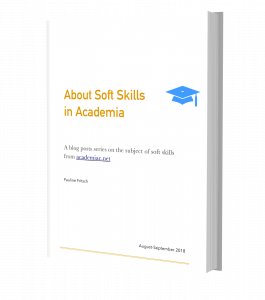This is the last article from a series of 6 blog posts about soft skills in academia, you can get a PDF containing the full 6 articles by subscribing to the newsletter below this post!
In one soft skills workshop I attended during my PhD studies, I was mentioned this survey from the EMBO (European Molecular Biology Organization) that asked senior life scientists to answer a few questions about soft skills. Looking back at it today, I find this survey results quite striking! A bit more than 400 scientists participated in it. Worth noting, it was performed in 2008, i.e. 10 years ago.
No need to go far to answer the question asked in this blog post title, here what the EMBO report says:
“When senior life scientists were asked whether they would like the younger scientists in their lab to receive (more) training in complementary skills, 71% replied “yes” (n = 421).”
However, reading the full report is quite worth it, plus it’s short (< 3 pages). Indeed, interestingly senior scientists were asked to rate which soft skills they think are more important for their PhD students, and which ones they rate as more important for themselves. And we can see some differences.
In the “importance of complementary skills for PhD students as seen by seniors”, time management comes in third position and project management is sixth. Skills which reach the top of the list are regarding research ethics, scientific knowledge and scientific communication (presentations, publications).
Then when senior scientists are asked “would you have liked to receive training in complementary skills earlier in your career? If so, which?” and “do you think you need to significantly improve your complementary skills? If so, which?”, the top of the podium is held by personnel recruitment/management. Next come in this order: time management, project management and writing of proposals.
Thus, senior scientists here acknowledge the need for more training in personnel recruitment, in personnel management, in time and in project management. However, they think that the priority for their students is to improve their scientific skills first (ethics, presentations, methods).
Is this some contradiction or does it simply mean that management skills should be acquired only during postdocs or even later?
In my opinion, it is a little bit of both. It makes sense to see scientific skills as a priority for PhD students, and yes postdocs should be offered high quality training in project and people management. However, I believe that for such management skills, the earlier and the more you can get training the better. Obviously, it is not because you attended 1 project management workshop that the next day you are a pro and all your projects will be perfectly handled. This is a skill which needs lots of practice and which will only get better with time. Yes, just like good wine. And the question asked by the EMBO is indeed “would you have liked to receive training in complementary skills earlier in your career?”.
When exactly one should get training for different soft skills probably depends on many factors, like the person natural skills and their career ideas, but also maybe the research field and their current working environment. However, one thing which is clear and which even senior scientists seem to agree with in this survey is that academics should be offered soft skills training as early as possible. That being said, better late than never.
More quotes from the EMBO report:
“If the shapers of European science want the scientists of the future to be better equipped with transferable skills and do excellent research, then much more administrative support must be ensured. [] The quality of all skills training courses must be subjected to tough quality control, as many seem to fall well short of expectations in terms of usefulness.”
“I would favour the establishment of a formal PhD training program that [] is organized by teachers for which such PhD training is not extra work.”
Some more recent refs:
“We recognize that principal investigators are sometimes reluctant to support their trainees’ attendance at professional and career development events. However, the skills developed during training can benefit the trainee and their research projects immediately (e.g., communications, teamwork, problem-solving).”
“We provide a list of soft skills that are important for collaboration and teamwork, based on our own experience and from an opinion survey of team leaders.”
Thanks for reading! 🙂
This post concludes a series of 6 blog articles about soft skills for academics, what are they, how to identify them, where to find training opportunity, how to know which ones are best for your career and a call for better communication.
I’ve put together these 6 articles in one PDF for you to read easily, subscribe here to get access!

In this series I didn’t focus on one specific soft skills, I talked about soft skills in general. And actually this last post is no conclusion, there is much more to be said, like how to find the time for such training when the whole system is already making everyone buried under work?
Nevertheless I will stop here for now in order to focus on one specific skill: project management! Check-out all my blog posts about project management in academia:
- How project management can help reducing PhD students’ anxieties
- How to use retro-planning to plan your PhD graduation
- Let’s try to plan a realistic To-Do list for the week
- Are Gantt charts useful for PhD students?
- Guidelines to draw a timeline of your PhD
- Project Management resource for PhD students and supervisors




0 Comments